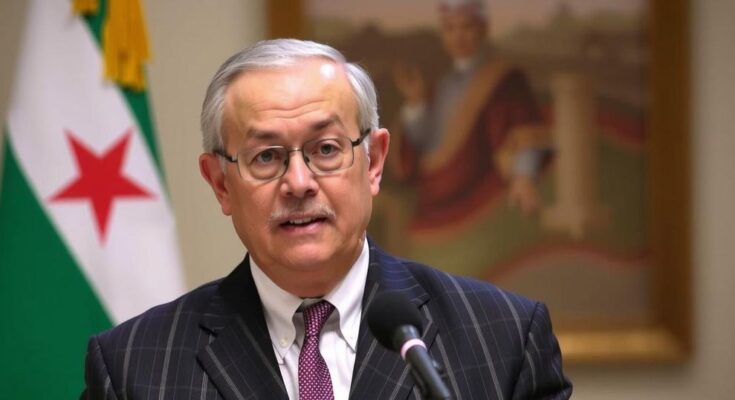Syria’s Foreign Minister Asaad Al Shibani will visit the UAE, Qatar, and Jordan to foster regional relations and investment opportunities, following earlier engagements in Saudi Arabia. These diplomatic efforts are part of a broader strategy to stabilize and reconstruct Syria after years of conflict, with increased support from neighboring Arab states. Controversies regarding international sanctions and border tensions with Lebanon persist, reflecting the complex geopolitical landscape.
Asaad Al Shibani, the Foreign Minister of Syria, announced on Friday that he will be undertaking official visits to the United Arab Emirates, Qatar, and Jordan this week. This tour follows his recent trip to Saudi Arabia, marking his first international engagement since assuming office. The new Syrian government is aiming to foster regional relations and attract investments for its reconstruction efforts after enduring a protracted conflict that severely damaged its economy and infrastructure. Mr. Al Shibani expressed hope that these visits would enhance stability and economic recovery, as well as promote significant partnerships among these nations. Although specific details surrounding the visits were not disclosed, regional diplomatic engagement seems to be increasing. Notably, foreign ministers from Kuwait and the Gulf Cooperation Council recently visited Damascus, signaling a potential thaw in relationships and support for the Syrian administration led by Ahmad Al Shara.
During his discussions with Saudi officials, including Prince Faisal, Mr. Al Shibani received assurances of support to secure Syria’s future. There have been calls among Gulf Cooperation Council diplomats to lift international sanctions against Syria, imposed primarily by Western nations in response to the Assad regime’s actions. This emerging wave of diplomacy is marked by invitations for collaboration and investment opportunities, indicated by Mr. Al Shara’s comment about Saudi Arabia’s role in Syria’s future. Additionally, Lebanon’s caretaker Prime Minister Najib Mikati noted that dialogue with Syrian officials has progressed, highlighting a desire for improved relations between the two nations. However, tensions along the Syrian-Lebanese border were noted following clashes between Lebanese soldiers and armed Syrians.
The recent diplomatic movements by Syria’s foreign minister indicate the new government’s proactive approach to international relations following over a decade of civil conflict. As Syria embarks on the challenging path to recovery, rebuilding its economic framework is critical. The involvement of other Arab states, particularly in the Gulf region, suggests a growing interest in Syria’s stability and economic rehabilitation. Domestic governance has shifted following the ousting of Bashar Al Assad, leading to changes in foreign policy outreach. Nations such as Saudi Arabia and Kuwait appear eager to engage with Syria’s current leadership to establish investment and cooperative initiatives that can support mutual growth and stability in the region.
In conclusion, Asaad Al Shibani’s planned visits to the UAE, Qatar, and Jordan illustrate Syria’s renewed diplomatic aspirations and commitment to rebuilding its economy. These engagements represent a significant shift in the interactions among regional powers, potentially paving the way for increased investment and cooperation. As diplomatic relations expand, the focus will also be on the lifting of sanctions and ensuring stability in the region amidst continuing challenges.
Original Source: www.thenationalnews.com




